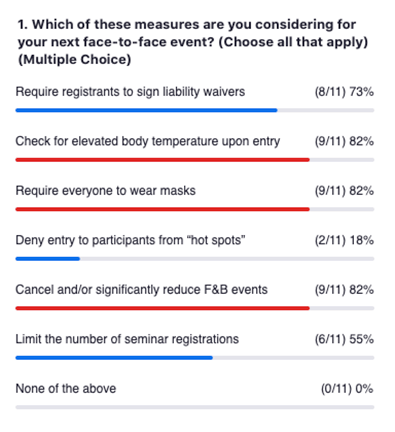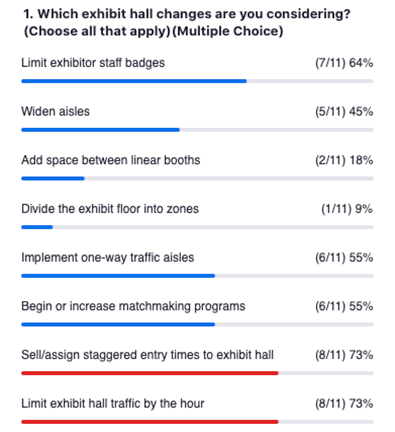Planning In-Person Exhibitions During COVID-19: ‘Tough Times for Us All’
What is within exhibition organizers’ power to produce safe face-to-face conventions in a COVID-19 world? That was the question explored in a recent Digital Summit, a weekly 90-minute live video chat information exchange series hosted by Sam Lippman, president and founder of Lippman Connects. Each subscription-based summit is comprised of 15 exhibitions and conventions professionals and experts exploring topics that have been crowdsourced from surveys of event executives. Upcoming summit discussions include format and platform (face-to-face, virtual, hybrid) decisions; pricing and profit models for exhibiting, sponsorship, and registration; and reinventing attendee acquisition with campaigns designed for hybrid and virtual events.
The June 12 session, “Safety Is Job One,” explored health and safety measures for the exhibit floor, educational and plenary sessions, and food, including meals, receptions and hospitality events. Participants were polled to gather their thoughts on several questions during the session, and here is how they weighed in on three areas:
[CHART] Safety Measures Three initiatives were cited most often: Check for elevated body temperature upon entry, require everyone to wear masks, and cancel and/or significantly reduce F&B events. The next most-popular response was to require registrants to sign liability waivers, followed by limiting the number of seminar registrations. A minority said they would consider denying entry to participants from coronavirus “hot spots.”
Three initiatives were cited most often: Check for elevated body temperature upon entry, require everyone to wear masks, and cancel and/or significantly reduce F&B events. The next most-popular response was to require registrants to sign liability waivers, followed by limiting the number of seminar registrations. A minority said they would consider denying entry to participants from coronavirus “hot spots.”
 Most participants said they would sell/assign staggered entry times to the exhibit hall and limit exhibit traffic by the hour, followed by limiting exhibitor staff badges. More than half said they would implement one-way traffic aisles and begin or increase matchmaking programs. Two less-popular options: adding space between linear booths and dividing the exhibit floor into zones.
Most participants said they would sell/assign staggered entry times to the exhibit hall and limit exhibit traffic by the hour, followed by limiting exhibitor staff badges. More than half said they would implement one-way traffic aisles and begin or increase matchmaking programs. Two less-popular options: adding space between linear booths and dividing the exhibit floor into zones.
[CHART] Destination Preparedness
Participants were asked to share their expectations about the readiness of cities for face-to-face events in the fourth quarter of this year, choosing from a list of seven. Las Vegas was the most popular response, followed by Orlando, Atlanta, and Houston. Anaheim and San Francisco were chosen next by an equal number and nearly two out of 10 participants thought that none of the cities (including Chicago, which was also on the list) would be ready to host in-person events.
“This Digital Summit confirmed that very experienced organizers — from associations and independents — are in the dark as they try to plan and market their events,” Lippman told Convene. “No one knows what’s needed to produce a safe event in this COVID-19 world. And no one knows who will be responsible, accountable, and who will pay for what’s needed to produce safe events. Tough times for us all.”

